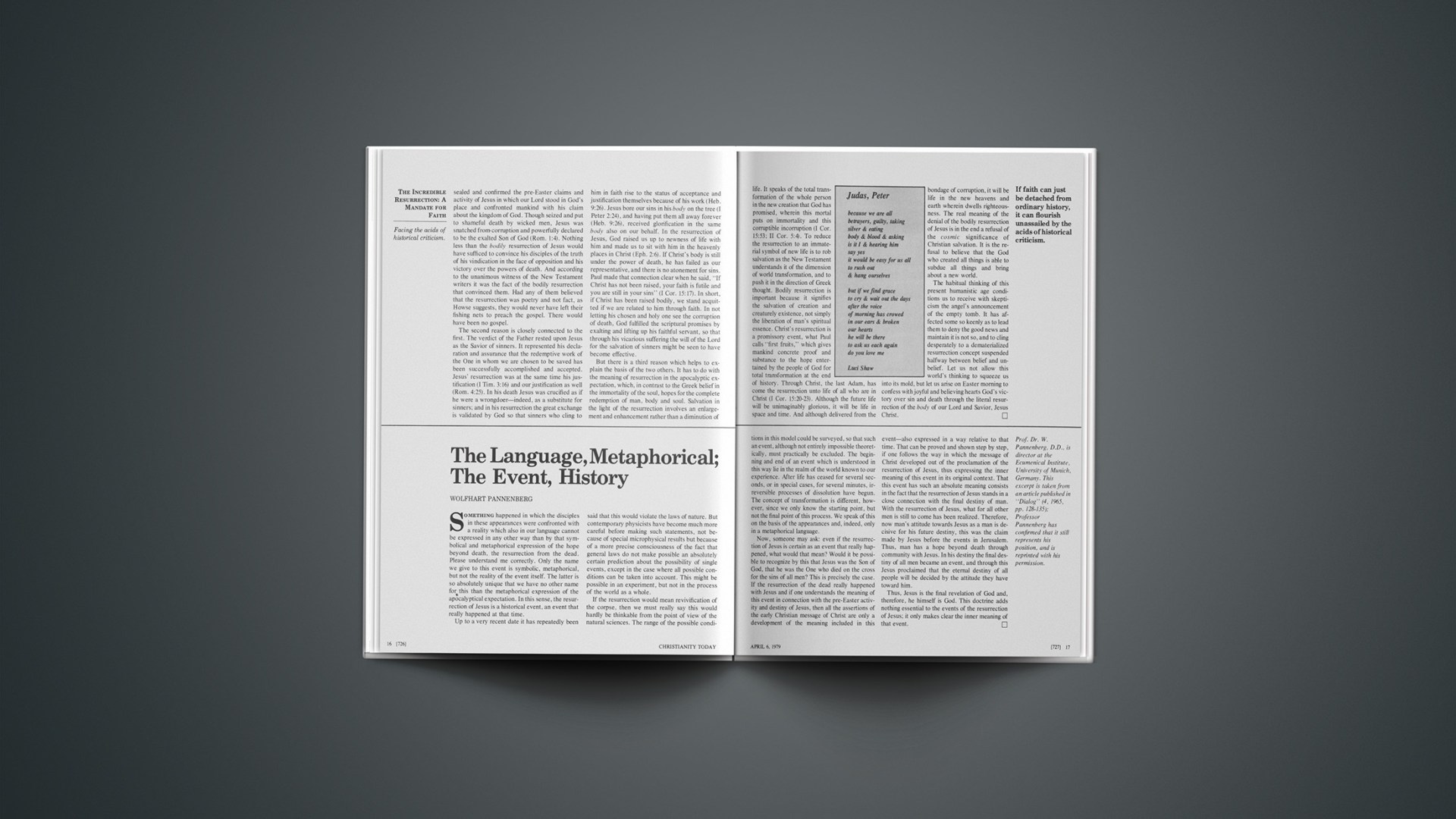because we are all
betrayers, guilty, taking
silver & eating
body & blood & asking
is it I & hearing him
say yes
it would be easy for us all
to rush out & hang ourselves
but if we find grace
to cry & wait out the days
after the voice of morning has crowed
in our ears & broken
our hearts
he will be there
to ask us each again
do you love me
Luci Shaw
Something happened in which the disciples in these appearances were confronted with a reality which also in our language cannot be expressed in any other way than by that symbolical and metaphorical expression of the hope beyond death, the resurrection from the dead. Please understand me correctly. Only the name we give to this event is symbolic, metaphorical, but not the reality of the event itself. The latter is so absolutely unique that we have no other name for this than the metaphorical expression of the apocalyptical expectation. In this sense, the resurrection of Jesus is a historical event, an event that really happened at that time.
Up to a very recent date it has repeatedly been said that this would violate the laws of nature. But contemporary physicists have become much more careful before making such statements, not because of special microphysical results but because of a more precise consciousness of the fact that general laws do not make possible an absolutely certain prediction about the possibility of single events, except in the case where all possible conditions can be taken into account. This might be possible in an experiment, but not in the process of the world as a whole.
If the resurrection would mean revivification of the corpse, then we must really say this would hardly be thinkable from the point of view of the natural sciences. The range of the possible conditions in this model could be surveyed, so that such an event, although not entirely impossible theoretically, must practically be excluded. The beginning and end of an event which is understood in this way lie in the realm of the world known to our experience. After life has ceased for several seconds, or in special cases, for several minutes, irreversible processes of dissolution have begun. The concept of transformation is different, however, since we only know the starting point, but not the final point of this process. We speak of this on the basis of the appearances and, indeed, only in a metaphorical language.
Now, someone may ask: even if the resurrection of Jesus is certain as an event that really happened, what would that mean? Would it be possible to recognize by this that Jesus was the Son of God, that he was the One who died on the cross for the sins of all men? This is precisely the case. If the resurrection of the dead really happened with Jesus and if one understands the meaning of this event in connection with the pre-Easter activity and destiny of Jesus, then all the assertions of the early Christian message of Christ are only a development of the meaning included in this event—also expressed in a way relative to that time. That can be proved and shown step by step, if one follows the way in which the message of Christ developed out of the proclamation of the resurrection of Jesus, thus expressing the inner meaning of this event in its original context. That this event has such an absolute meaning consists in the fact that the resurrection of Jesus stands in a close connection with the final destiny of man. With the resurrection of Jesus, what for all other men is still to come has been realized. Therefore, now man’s attitude towards Jesus as a man is decisive for his future destiny, this was the claim made by Jesus before the events in Jerusalem. Thus, man has a hope beyond death through community with Jesus. In his destiny the final destiny of all men became an event, and through this Jesus proclaimed that the eternal destiny of all people will be decided by the attitude they have toward him.
Thus, Jesus is the final revelation of God and, therefore, he himself is God. This doctrine adds nothing essential to the events of the resurrection of Jesus; it only makes clear the inner meaning of that event.









